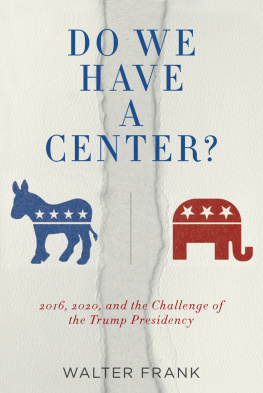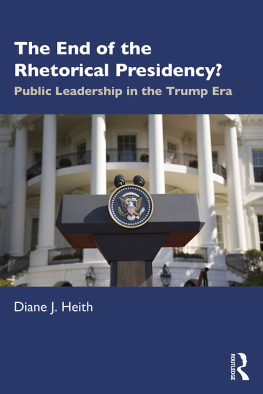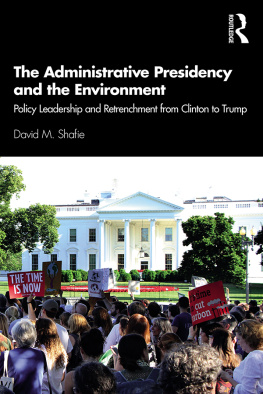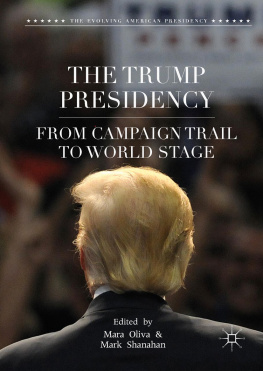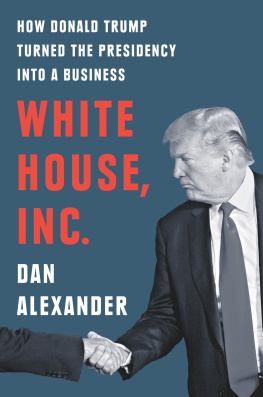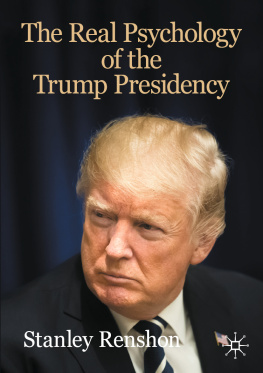Copyright 2019 by Walter M. Frank
All rights reserved. No part of this book may be reproduced in any form by any electronic or mechanical means (including photocopying, recording or information storage and retrieval) without permission in writing from the publisher
ISBN: 978-0-578-54105-1
ISBN: 978-1-087-80352-4 (e-book)
Library of Congress Control Number: 2019909803
LRD Press
41 Riverside Drive
Princeton, New Jersey 08540
Praise for Other Works by the Author
Law and the Gay Rights Story
The balance of deep treatment of legal issues, vivid event coverage, honest critiques of the movement, and particular attention to the individuals who faced enormous risks fighting for gay rights makes this book an engaging and meaningful read.
HARVARD LAW REVIEW
Making Sense of the Constitution
an engaging and readable study of how and why the Court does what it does and with what intellectual and other resources, when it interprets the constitutional text. Frank has read widely and he cogently but lightly responds to claims and counterclaims by presenting the findings of many scholars.
JETHRO LIEBERMAN IN THE POLITICAL SCIENCE QUARTERLY
Acknowledgments
First, let me simply express my deep appreciation to a number of scholars for their comments, criticisms, suggestions and support. Whatever shortcomings diminish this work would have been greater but for their generosity. I would like to thank in particular Hal Feiveson, Robert Freidin, Stan Katz, Ed Rubin, Stephen Skowronek, Jeff Tulis, Dan Wood, and Mike Zuckerman. Thanks also to the wonderful journalist Tish Durkin for her insightful thoughts on the manuscript.
Second, I am blessed with numerous friends whose judgment I value and who allowed me to inflict earlier drafts of the manuscript on them. Their comments were also very helpful. In this connection, let me express my special gratitude to Gary Mailman, Steve Newman, and David Vilkomerson.
Finally, I extend a special thanks to my wife, Lydia, for not complaining as I monopolized the computer and for simply being the person she is. As much as we both love books, we know that there are a few things even more important.
Introduction
P olitics was once described as the art of the possible. It no longer feels that way. Today, it seems more like a battle between two feudal armies. Part of this book aims at showing it doesnt have to be that way. Polarization didnt start with Trump and it wont end with him unless we can somehow rescue the country from the political ditch into which it has fallen. So another purpose of this book is to examine just how we got here and how the Democrats, with the right kind of message and an appealing candidate, can lead the way to a more sensible politics.
In 2016, however, Hillary Clinton made a terrible mistake: she thought she could win if she simply replicated the Obama coalition. She was wrong, and examining why she was wrong, how she misunderstood the electorate, and how and why an outsider like Donald Trump turned out to be the more effective candidate is also a key purpose of this effort.
In 2012 author and columnist Gail Collins wrote: there is virtually nothing, no matter how crazy, that you cant get 18 percent of Americans to support if theyre in a bad enough mood. Her proof? In the spring of 2011, 17 percent of likely Republican primary voters said they thought it would be a good idea to nominate Donald Trump for president (GC 13). Five years later, of course, almost half the country must have been in a very sour mood, electing Donald Trump the forty-fifth President of the United States.
So how did a notion deemed so preposterous in 2011 that Collins thought it a marker for lunacy become our political reality in 2016? And what kind of nation have we become? Are we really divided into two armed camps as many commentators and politicians would have us believe? Is there, as the title of this book asks, still a center worth worrying about in todays politics?
These are important questions not only for understanding the recent past but because they bear importantly on what may happen in 2020 and, even more importantly, on the future direction of the country.
Let me give you a slightly more detailed roadmap for our journey together.
recounts the events of the 2016 general election. It is an important exercise even if painful for those like myself who did not support the winning candidate. Although the racist overtones of Trumps campaign were deeply disturbing, it would be a mistake to overlook the many ways in which his team ran a better campaign than Hillary Clintons, better focused strategically and organizationally, much more attuned to what was actually going on in the country, playing better to the candidates strengths, and with much better lines of communication and decision-making.
Over the last two years, I have examined most all the literature relating to the 2016 election, everything from memoirs and journalistic retellings to statistically laden academic studies. The results of that effort are reflected in in white racial anxiety. I dont find them persuasive and explain why. Finally, I address all the different aspects of the race that might have made a difference in the outcome. Trumps victory had many contributors from then-FBI Director James Comey to Green Party candidate Jill Stein, from the Russians to the dynamics of social media. We examine all these factors and others as well.
The novelist William Kennedy has written the man of power achieves power only because he fulfills the needs of others in both obvious and secret ways (WK 168). Just how Trump fulfilled those needs is the overarching story of and provides an important backdrop to the 2020 election.
makes the case for a more centrist politics, defining centrism not as a place on the political spectrum but as a mindset for how we approach politics itself. The cards are currently stacked against the kind of politics I seek and I show how online media has been particularly complicit in this development. I also suggest how it can play a more constructive role in 2020.
his appeal to the broader electorate. Trump will be an extremely formidable candidate and I describe some of the advantages he will enjoy. The main business of the Chapter, however, deals with the Democrats, describing what I believe they must do and not do to defeat Trump in 2020.
Ive written this book because I think we are at a pivotal moment in our history, one that requires us to understand both our recent past and the fundamental nature of the choice we will be facing in 2020. One can find Trumps campaign message deeply disturbing and in many cases deceitful, but the fact remains that Donald Trump was in many ways the superior candidate in 2016. I dont think anyone can read the first two chapters and not come to a similar conclusion though I didnt set out to prove a particular point one way or the other. I also believe, however, that Trump has proven to be a deeply flawed President flawed in such ways that, if legitimized by his re-election, will make the dysfunctional course of our politics even more difficult to reverse. It is why I offer my own thoughts suggesting a path for victory for the Democrats in 2020.
I have been around a long time. If you had told the fifteen year old Walter in 1960 that there would be no war in Europe for the balance of my lifetime, that the Soviet Union would simply disappear without the firing of a single shot, that the systematic legal oppression of African Americans in our American South would finally meet its end, that by the end of the decade we would have a man on the moon and that decades later we could carry in our pocket a device that would let me immediately access the accumulated knowledge of all mankind while reminding my sister living in Perth Australia of the dates of our impending visit, all while sitting on the 104 bus making its way down Broadway, I would probably have looked around for a policeman or simply hurried on my way.


